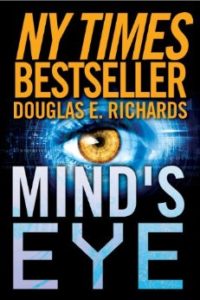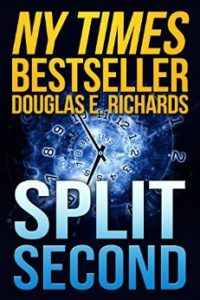Douglas E. Richards interview
Douglas E. Richards is a New York Times Bestselling author who writes incredibly popular techno-thrillers, such as Mind’s Eye and his most recent publication, Game Changer. He took some time out from writing his new book to answer a few questions..
How would you describe the sub-genre of science fiction in which you write?
All of my adult novels so far are near future science fiction thrillers, in which science and technology play a huge role. These novels are set about five to twenty years in the future, and along with twists and turns and action, I try to examine the pros and cons of transformative technologies. The greater our technology, the greater our ability to play God, the thornier our moral and ethical choices become.
Do you have a favorite among your novels?
This is a tough question. Wired was my first adult novel (after I had written some middle grade science fiction), and really made my career. I was ready to give up on my dream of writing when Wired went viral and made the New York Times and USA Today bestseller lists. This novel dramatically changed my life. On the other hand, I’d like to think I’ve grown as a writer since then, and while numerous fans still think Wired is my best work, there are those who prefer my more recent offerings.
To answer a different question, the novel that has been read the most, not counting Wired, would have to be Split Second. Since its publication, Split Second had spent almost four months as one of Amazon’s top one hundred books.
What is Split Second about?
Split Second is my time travel novel. I’m very proud of this one, because I managed to find what I think is a fascinating take on this subject that I had never seen done before. Time travel has been extraordinarily popular since the days of H.G. Wells, and never more so than today (rivaling even zombies, werewolves, and vampires). And while almost every single aspect of the genre has been done a thousand times, most of these stories are still wildly entertaining.
Even so, I set out to find a unique angle on the subject. For almost three months I did nothing but read and think on the subject of time and time travel. I read several books written by physicists on the nature of time, and how time travel might actually be achieved (since physics does not rule it out). Then I read time travel stories until I was almost blind. If you have a Kindle you can get megapacks of time travel stories—basically hundreds and hundreds of them, for very little money. I studied the logic of these stories and organized them into nine different categories (change the past and the universe splits, the universe won’t let you change the past no matter how hard you try, and so on). Finally, after straining my brain to its limits, I had my eureka moment and found the twist on the genre I was looking for, one I thought was unique (at least to me).
What do you enjoy the most about writing, and what do you enjoy the least?
I love ideas more than anything. Thinking technological advances through to their logical conclusions. Suppose you have electronic implants in your brain that allow you to surf the web with your thoughts (which is the subject of my Mind’s Eye series). Sounds awesome. But what about addiction? Addiction is a big enough problem with the plain old Internet we have today—the one that isn’t in our heads, that doesn’t stream results directly into the visual centers of our brains. And given that your eyes can now record everything you see and send it to the cloud, what about privacy? I don’t want to give away any spoilers, but there are many more possibilities than are apparent at first glance.
My favorite part of writing is having the chance to perform a rigorous examination of all the possibilities that new technologies make available, hammering at them relentlessly like piñatas to see what will fall out.
What I don’t love is coming up with plots. I believe that my plotting is what attracts readers to my work, so I’m very demanding of my plots. Unfortunately, I never quite figure everything out until I’m well over halfway through, which creates huge anxiety for me. Since I refuse to finish a novel unless I absolutely love the ending, I’m often stalled for weeks at a time while I try to figure one out. Each time I’m convinced it’s impossible, and that I’ll never do it. Each time I somehow find a way—at least I have so far. But I always pull out handfuls of hair along the way.
I notice you provide your email address just about everywhere, and encourage readers to write to you. How many of these do you respond to?
All of them. Writing is lonely work, and many times these messages really keep me going when I’m ready to throw my computer through the window. Also, I’m grateful that I have any readers, so I want to treat each and every one as well as I can.
What writers most influenced you?
I would have to say Asimov and Crichton. I loved Asimov as a kid. He tried to use accurate science and he always had a jaw-dropping twist at the end, which is something I’ve tried to do as well. Crichton was one of the first to combine the thriller and science fiction genres, and is the author to whom I’m most frequently compared.





